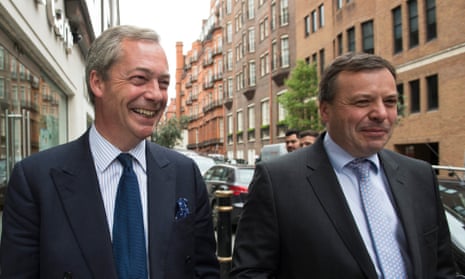The Electoral Commission has launched an investigation into “potential offences” by Leave.EU over its spending during last year’s EU referendum campaign.
The campaign group, which was headed by Nigel Farage and the businessman Arron Banks, is understood to have worked with the data firm Cambridge Analytica, which uses social media to influence voters.
Cambridge Analytica’s involvement was not declared to the election watchdog, which has concluded that Leave.EU has a case to answer. If the commission decides that political spending laws have been breached, it can report the campaign group to the police.
In response to the elections watchdog’s announcement, Farage tweeted:
Could the timing of this be anything to do with the general election? https://t.co/GxLailoQLU
— Nigel Farage (@Nigel_Farage) April 21, 2017
A spokesman for the watchdog said: “The Electoral Commission has begun an investigation into Leave.EU’s EU referendum spending return. This followed an assessment which concluded that there were reasonable grounds to suspect that potential offences under the law may have occurred.
“The investigation is focused on whether one or more donations – including of services – accepted by Leave.EU was impermissible; and whether Leave.EU’s spending return was complete.”
Banks said Leave.EU would not cooperate with the investigation and threatened legal action against the commission. “We fully and correctly complied with the Electoral Commission rules on spending during the referendum. We have answered all of their questions,” he said in a statement.
“Today’s announcement is politically motivated and the timing is intended to cause maximum damage just before the general election. We will not be cooperating any further with the commission and we will see them in court.”
Stephen Kinnock, the Labour MP for Aberavon, said he was pleased the Electoral Commission was investigating.
Campaigners have to declare services worth more than £7,500, as well as cash donations.
The news marks another chapter in Leave.EU’s controversial relationship with Cambridge Analytica, which claims to have played an influential role in the US election by identifying key swing voters. The company was linked first to the Republican candidate Ted Cruz and then to Donald Trump’s presidential campaign.
It also has ties to the US billionaire Robert Mercer, who poured money into Trump’s campaign, and Steve Bannon, Trump’s chief strategist.
There has been confusion about Cambridge Analytica’s involvement in the Brexit campaign. In February last year, the firm’s chief executive, Alexander Nix, published an article stating that it had “already helped supercharge Leave.EU’s social media campaign by ensuring the right messages are getting to the right voters online”.
Last June, however, Andy Wigmore, the head of communications for Leave.EU, told the Guardian: “Cambridge Analytica were initially sounded out to carry out similar work that they did for Ted Cruz if we got designation. We didn’t so we did not get the chance to use them.”
Vote Leave, rather than Leave.EU, was the official Brexit campaign group.
In February, Wigmore insisted to the Observer that Leave.EU had not “employed” the company, but suggested they had been involved in the campaign, saying: “They were happy to help.”
Wigmore said: “Because Nigel is a good friend of the Mercers, and Robert Mercer introduced them to us, he said, ‘Here’s this company we think may be useful to you.’ What they were trying to do in the US and what we were trying to do had massive parallels. We shared a lot of information. Why wouldn’t you?”
Electoral Commission guidance states that a gift of property, goods or services, or an offer of a noncommercial discount, must be valued at the market rate. If this information is unavailable to a campaign group, the watchdog says: “You should find out what similar providers charge for the same property, goods or services and use this as the market rate.”
Banks, who is currently considering standing in Clacton in June’s general election, had earlier dismissed the news, tweeting:
We are used the establishment attacks ! Hope you had a great day at lord's - bit chilly ? https://t.co/Ht4mz6v4hB
— Arron Banks (@Arron_banks) April 21, 2017
Cambridge Analytica, which has offices in London, New York and Washington, uses data analysis to build up sophisticated profiles of individuals to predict how they might vote. Campaigns can then focus highly targeted advertising on voters.
On its website, Cambridge Analytica’s parent company SCL defines itself as a “behavioral research and intervention agency” that carries out “psychographic targeting”.
In a promotional video, Nix said that they took “demographic consumer and lifestyle data” and blended it with “psychographic data, which is a modelling of personality to be able to target and communicate with people about the things that they really really care about, but more importantly, in a way that really resonates with their personalities”.
The Information Commissioner’s Office has already launched an investigation into Cambridge Analytica and its use of voters’ personal data.
Richard Tynan, a technologist at Privacy International, said he was concerned that people did not understand how politicians were tracking their online habits.
“The coming together of big data and advertising to influence the democratic process is a major concern facing most developed countries. This is far beyond opinion polls,” he said.
The Electoral Commission is also understood to be looking at spending by the official Brexit campaign. Vote Leave gave £625,000 to a student called Darren Grimes, which he then used to hire a company called AggregateIQ. AggregateIQ then produced a targeted pro-leave Facebook ad campaign.
